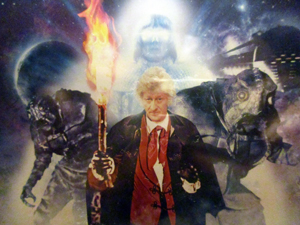The Mutants
“Genocide as a side effect!!” – The Doctor
Thematically this should have been one of the best Doctor Who stories ever as it tackled the vestiges of colonialism, authoritarianism, racism, apartheid, human experimentation, and ecological devastation all within the framework of a well-written and principled story with some great sci-fi concepts. Unfortunately, all of this is let down by some quite less than stellar acting and some cool but overly ambitious special effects and costuming. As a result, this story often gets relegated to a very low place in the Pertwee era.
The show does take a pretty big leap in terms of futuristic story-telling here with the concepts of a Skybase, colonization through planetary engineering, London as a sky city, and the elaborate fueling of a spaceship with thaesium radiation. Add to that the idea that the slowly unfolding mystery that entire ecosystem of the planet undergoes a butterfly-like metamorphosis at 500 year cycles, and you have yourself a pretty good sci-fi story already. There are very elaborate costumes and effects throughout, lots of use of colorful rainbows of light and camera overlays. The native Solonians seem modeled after ancient Europeans like I’d suggested could have been useful in an earlier story. (I’d forgotten that they did so in these episodes.) Other good points include the atmosphere from filming in real caves and the ecological message in the Doctor’s description of future Earth history (“Grey cities linked by grey highways across a grey desert.”).
That the empire of Earth wrecks the local ecosystem for mining the planet—once subjecting the natives to virtual slavery and now wrestling with calls for their independence–sets up a really good social aspect of the story. With nods to the racial division of apartheid (separate cubicles for Overlords and Solonians for example) and the smugness of colonial handovers of independence, there is a lot going on in the subtext and the show gets to establish the moral outrage of the Doctor very well. It is full of digs at those who blindly accept injustice (“You were simply obeying orders. That’s a common excuse, Professor.”) and shows the negative effects of occupation for those labeled “the dispossessed, the outcasts, the terrorists.” Despite all these good elements, it’s a real shame the story doesn’t gel as a whole.
Best (or worst) unsettling moments:
The trippy scenes of lights and color in the caves are dated but still have a sense of oddness with the slowed down movements of the characters. I supposed the most unsettling part of the story, however, is just seeing how the obviously tyrannical Marshal keeps getting away with injustice—especially because I know this is a reflection of the reality of many subjugated people around the world.
Firsts:
- Very clear anti-racist message
Regrets:
If only this had been better acted and directed, it could have been one of the best of the show. There are a few missteps in the storyline to be corrected though—like why Jo would go running into sure death to follow Ky just out of the motivation to tell him the Doctor has a package to deliver to him? There should have been some build-up to better justify her willingness to risk her life, like her having first heard the story of the subjugation of his people. Also, there’s too much ambivalence in Stubbs and Cottons actions—they were too willing to kill the Solonians previously to make them the heroic figures they’re supposed to be by then end in my view.

